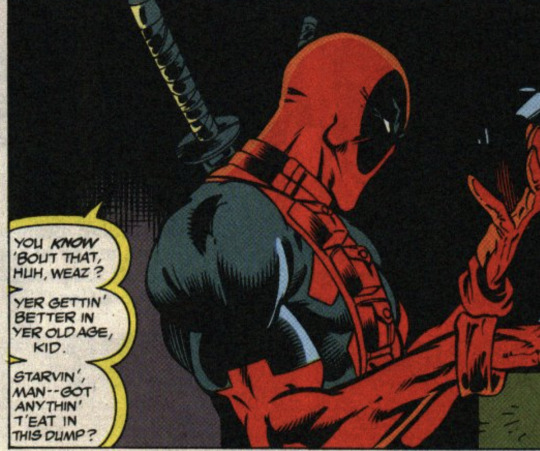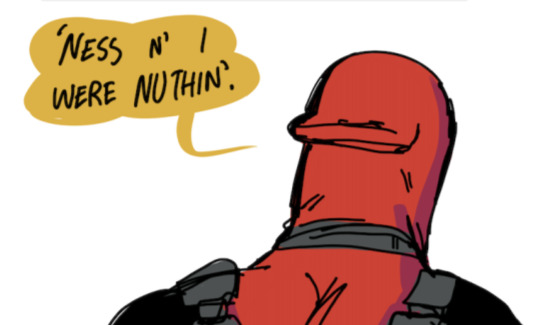#i don't like all the kind of.. mythology they started introducing to spider-man in the 2000s. not into it.
Explore tagged Tumblr posts
Note
Pre-2000s comics are superior for being able to make their characters not be as clear-cut and stereotypical (classic Peter Parker and his personality, motivations and views on stuff, pre-2000s Wolverine for being more than just the wild berserker but a man with strong morals and hobbies/interest you wouldn't expect for a gruff berserker) AND for writing out their accents (reading 90s Wades accent can be a wild experience sometimes and i miss that) whitch helped with making them sound unique and recognizable
GOD i miss wade's accent SO much. i loved the way he talked.

it's something i try to write in when we're in flashbacks or when i'm writing the cablepool fics - wade talks a whole lot more like he did in the older comics.



BRING back wade's stupid accent i say. i miss when he talked like a looney tunes character.
#i think there were still a bunch of good comics in the 2000s but. i wholeheartedly agree that pre-2000s peter parker was.#so much more fun pre-2000s#i think a lot of things got way too serious in the 2000s. comics included.#i don't like all the kind of.. mythology they started introducing to spider-man in the 2000s. not into it.#i always was about peter parker just being an ordinary guy who just happened to have been bitten by a spider.#i kind of hate any storyline that frames peter as somebody special or cosmically chosen or anything. not into it.#also was far more into the silly goofy day-to-day nonsense prior. the 2000s everything started having to be world-ending stakes.#there's probably a reason for that. hm. hm.#sci speaks#i could write an essay about th
107 notes
·
View notes
Note
Question based on the fascinating Wild Talent's Axes post. Why do you think most adaptations of High Blue settings change them into lower Blue settings?
I think there's basically two reasons for that.
Reason one is that I think that on some level the executive-suite-level aversion to looking too silly or wacky and scaring off unfamiliar audiences was, at the time that it reigned supreme over all of these creative decisions, unfortunately just kind of correct. You're doing Spider-Man, alright, you can kind of bank on the audience's ambient knowledge of Spider-Man to buoy along the question of "How and why Spider-Man" and maybe "How and why Green Goblin." You bring in enemies outside of that paradigm, you bring in wizards, vampires, aliens, now you gotta explain those things too, you gotta spend bandwidth on that. There's a real murky middle ground here between a cynical fear of looking too silly, and a genuine scope and focus problem- how much value added is there in pulling away from the core mutant stuff to start mucking around with the Shi'ar or Cyttorak or Belasco or Dracula? I don't think it's a coincidence that I don't hear people bringing up the fact that there were aliens in Dark Phoenix.
The Suicide Squad(s) are actually a really good example of this issue. Suicide Squad, while very bad, was actually a very high blue movie, to the extent that it actually fucked with the pacing when they kept turning to the camera to introduce new origin stories, to the point of creating a tone-and-theme clash with the previous two movies where this stuff was mostly framed as much rarer and more disruptive. The Suicide Squad was equally high-blue, but also much more deliberate and naturalistic in conveying that this was a superhero setting rife with weirdos. Naturalism is a watchword with this kind of thing.
Which brings us around to issue two, right, which is that, as much as I love the high-blue bullshit of the golden and silver age, you're huffing glue if you think those settings became like that due to some deliberate creative ethos. They needed to meet monthly deadlines and they were writing for small children, it was the corporatized version of making up a bedtime story off the cuff, and over time the nonsense simply accumulated. Later writers take that precedent and run with it to do interesting and valuable things, but if you're creating a classic high-blue superhero setting from scratch these days it's almost always a form of emulation. Approached without clarity of purpose, it can make for weird or bad or messy writing!
Ultimate Spider-Man is an example of a comic adaptation that bleached the blue, and that decision- to tie all of Spidey's villains to a common origin- resulted in a really strong story. Stronger themes, stronger character dynamics, stronger worldbuilding and stronger, cohesive political messaging. Objectively the correct decision for the project they were going for. Tightening the blue can let you do things- it lets you sift through and find the strongest shared points between the disparate elements of the mythology, assemble them into something thoughtful and directed.
#thoughts#meta#longer than it was supposed to be#superheroes#mcu#dceu#marvel#dc comics#wild talents#ask#asks#effortpost
48 notes
·
View notes